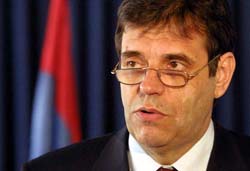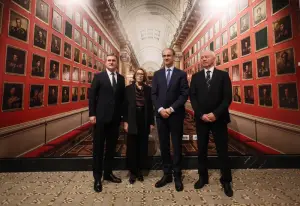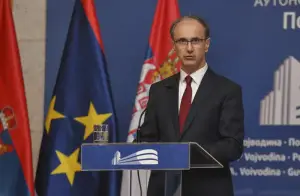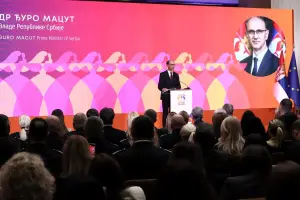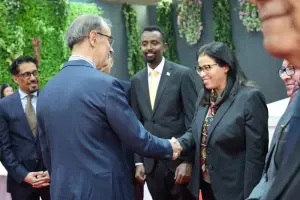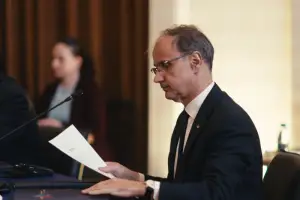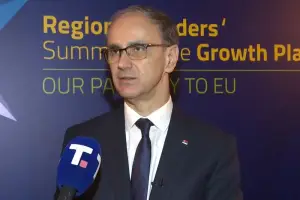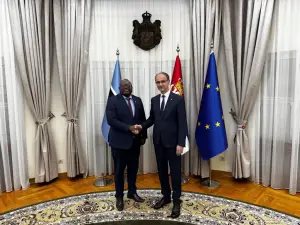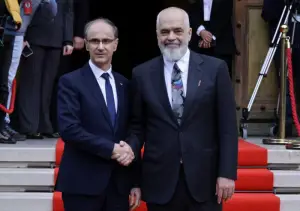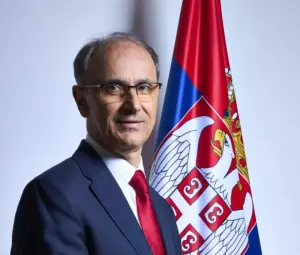Q:
A:
Prime Minister addresses summit of regional leaders
Belgrade/Bucharest,
11 May 2005
Serbian Prime Minister Vojislav Kostunica addressed the 8th summit of heads of states and governments of South East European Cooperation Process (SEECP) member states in Bucharest saying that every violent or imposed change of internationally recognised borders threatens regional stability, which is why Serbia strongly pledges for joint affirmation of the general principle of inviolability of internationally recognised borders.
The Prime Minister said that the forum yielded many important achievements this year, specifically in the further setting up of foundations for a more intensive cooperation between its member states.
Kostunica said that forming the Southeastern European energy community is of great importance because it will be a model for future concrete forms of cooperation, both among the member states and in cooperation with the EU.
The transfer of EU Stability Pact’s Migration, Asylum, Refugees Regional Initiative (MARRI) under the wing of the forum is a big step toward strengthening the general concept of regional ownership and building responsibility in line with European standards, Kostunica said.
He went on to note that the recent signing of the joint document on Roma inclusion initiative will draw special attention to this ethnic community in the region in the next decade.
The Prime Minister said that the time has come for creating truly multicultural societies within existing states where ethnic issues will not be resolved through separation but rather through integration.
The state union of Serbia-Montenegro has made several important steps in this sense in order to overcome the inherited problems, Kostunica said.
There has been advancement in the area of legal and economic reforms and constitutional and institutional changes, he said and added that the whole process of internal consolidation resulted in a positive feasibility study by the EU Council of Ministers.
The launch of negotiations on the stabilisation and association agreement should start on October 5, Kostunica said, noting that this clearly shows Serbia-Montenegro’s resolve to integrate within Europe.
Serbia-Montenegro, taking the central place in the region, is once again an important factor for regional stability, he said.
Kostunica noted that relatively small markets are not attractive for serious foreign investors, which is why Serbia-Montenegro will keep supporting further liberalisation of trade relations in the region.
“Only through strong regional economic cooperation can our economies upgrade their levels and boost their efficiency. That is why we support Bulgaria’s initiative to sign a declaration on building infrastructure network in Southeastern Europe. An improved transportation infrastructure and shorter and safer roads for transporting energy sources are crucial not only for us, but also for our European partners”, said Kostunica in his address.
Kostunica expressed assurance that political stability and strong regional cooperation are preconditions for sustainable economic development in Southeastern Europe.
Kostunica reiterated that every violent or imposed change of internationally recognised borders threatens regional stability, which is why Serbia strongly advocates joint affirmation of the generally accepted principle of inviolability of internationally recognised borders so that the politics leading to sustainable political and economic stability in the region can be implemented.
Serbia-Montenegro has recently confirmed once more its commitment to compromise and dialogue as methods for resolution of open political issues in the region, Kostunica said noting that Kosovo is currently the most complex problem in the region. It has to be solved gradually and carefully, he noted. Serbia-Montenegro requires full respect of UN Security Council Resolution 1244 and much more resolute engagement of UNMIK in the implementation of standards, especially in securing conditions for the return of as large a number of displaced Serbs and other non-Albanians as possible, according to Kostunica.
The Prime Minister said that less than 3 percent of those who were forcibly expelled have returned so far. That is largely influenced by poor results in the return of confiscated property, especially apartments and houses, he said.
According to Kostunica, Serbia has recently initiated a political dialogue between Belgrade and Pristina at all levels. He expressed satisfaction with the fact that four groups of the Vienna dialogue discussing the so-called technical issues have resumed their work. “We hope that a real progress will be made soon concerning the beginning of dialogue on the problem of decentralisation as the most important political problem in Kosovo-Metohija and a precondition for survival, return and safe life of non-Albanian population”, he noted.
Kostunica stressed that with all these initiatives, Serbia wants to contribute to real implementation of standards in the province. However, he assessed that the real measure of the level of implementation is not the political process, but the results in the field, especially concerning the freedom of movement, safety and return. “We will do everything to contribute to their implementation, but we will take into account only the real progress made, and not promises and proclamations”, said Kostunica adding that that is why Serbia endorses dialogue, agreements and compromise, and not forced and one-sided solutions. A solution cannot be just and acceptable if one party gains everything, and the other looses everything.
“We want interests of both peoples to be taken into account because only a compromise solution can lead to a sustainable and lasting regional stability. This means that our common obligation is to find a solution that would not entail changing the existing state borders, but granting greater autonomy to Kosovo-Metohija”, Kostunica said in his address to participants in the Bucharest summit.
The SEECP member states are Serbia-Montenegro, Albania, Bulgaria, Romania, Greece, Macedonia, Turkey, Croatia and Bosnia-Herzegovina. The Process was established in 1996 as a political forum of foreign ministers, and the first summit was held the next year in Greece.
Kostunica said that forming the Southeastern European energy community is of great importance because it will be a model for future concrete forms of cooperation, both among the member states and in cooperation with the EU.
The transfer of EU Stability Pact’s Migration, Asylum, Refugees Regional Initiative (MARRI) under the wing of the forum is a big step toward strengthening the general concept of regional ownership and building responsibility in line with European standards, Kostunica said.
He went on to note that the recent signing of the joint document on Roma inclusion initiative will draw special attention to this ethnic community in the region in the next decade.
The Prime Minister said that the time has come for creating truly multicultural societies within existing states where ethnic issues will not be resolved through separation but rather through integration.
The state union of Serbia-Montenegro has made several important steps in this sense in order to overcome the inherited problems, Kostunica said.
There has been advancement in the area of legal and economic reforms and constitutional and institutional changes, he said and added that the whole process of internal consolidation resulted in a positive feasibility study by the EU Council of Ministers.
The launch of negotiations on the stabilisation and association agreement should start on October 5, Kostunica said, noting that this clearly shows Serbia-Montenegro’s resolve to integrate within Europe.
Serbia-Montenegro, taking the central place in the region, is once again an important factor for regional stability, he said.
Kostunica noted that relatively small markets are not attractive for serious foreign investors, which is why Serbia-Montenegro will keep supporting further liberalisation of trade relations in the region.
“Only through strong regional economic cooperation can our economies upgrade their levels and boost their efficiency. That is why we support Bulgaria’s initiative to sign a declaration on building infrastructure network in Southeastern Europe. An improved transportation infrastructure and shorter and safer roads for transporting energy sources are crucial not only for us, but also for our European partners”, said Kostunica in his address.
Kostunica expressed assurance that political stability and strong regional cooperation are preconditions for sustainable economic development in Southeastern Europe.
Kostunica reiterated that every violent or imposed change of internationally recognised borders threatens regional stability, which is why Serbia strongly advocates joint affirmation of the generally accepted principle of inviolability of internationally recognised borders so that the politics leading to sustainable political and economic stability in the region can be implemented.
Serbia-Montenegro has recently confirmed once more its commitment to compromise and dialogue as methods for resolution of open political issues in the region, Kostunica said noting that Kosovo is currently the most complex problem in the region. It has to be solved gradually and carefully, he noted. Serbia-Montenegro requires full respect of UN Security Council Resolution 1244 and much more resolute engagement of UNMIK in the implementation of standards, especially in securing conditions for the return of as large a number of displaced Serbs and other non-Albanians as possible, according to Kostunica.
The Prime Minister said that less than 3 percent of those who were forcibly expelled have returned so far. That is largely influenced by poor results in the return of confiscated property, especially apartments and houses, he said.
According to Kostunica, Serbia has recently initiated a political dialogue between Belgrade and Pristina at all levels. He expressed satisfaction with the fact that four groups of the Vienna dialogue discussing the so-called technical issues have resumed their work. “We hope that a real progress will be made soon concerning the beginning of dialogue on the problem of decentralisation as the most important political problem in Kosovo-Metohija and a precondition for survival, return and safe life of non-Albanian population”, he noted.
Kostunica stressed that with all these initiatives, Serbia wants to contribute to real implementation of standards in the province. However, he assessed that the real measure of the level of implementation is not the political process, but the results in the field, especially concerning the freedom of movement, safety and return. “We will do everything to contribute to their implementation, but we will take into account only the real progress made, and not promises and proclamations”, said Kostunica adding that that is why Serbia endorses dialogue, agreements and compromise, and not forced and one-sided solutions. A solution cannot be just and acceptable if one party gains everything, and the other looses everything.
“We want interests of both peoples to be taken into account because only a compromise solution can lead to a sustainable and lasting regional stability. This means that our common obligation is to find a solution that would not entail changing the existing state borders, but granting greater autonomy to Kosovo-Metohija”, Kostunica said in his address to participants in the Bucharest summit.
The SEECP member states are Serbia-Montenegro, Albania, Bulgaria, Romania, Greece, Macedonia, Turkey, Croatia and Bosnia-Herzegovina. The Process was established in 1996 as a political forum of foreign ministers, and the first summit was held the next year in Greece.

